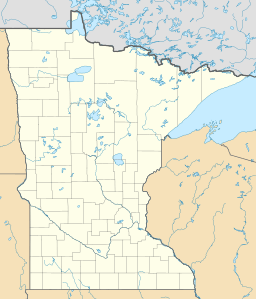Anderson Lake (Poplar River) facts for kids
Quick facts for kids Anderson Lake |
|
|---|---|
| Location | Cook County, Minnesota, U.S.. |
| Coordinates | 47°47′21″N 90°48′10″W / 47.78917°N 90.80278°W |
| Primary outflows | Poplar River |
| Basin countries | United States |
| Surface area | 28 acres (0 km2) |
Anderson Lake is a cool lake located in Cook County, Minnesota, USA. It's not huge, covering about 28 acres, which is like 28 football fields! This lake is a source for the Poplar River, meaning water flows from Anderson Lake into the Poplar River.
The lake has two main parts, almost like two connected puddles. The western part is about 15 acres, and the eastern part is about 13 acres. It's important not to mix up this Anderson Lake with another one nearby. There's another Anderson Lake that feeds into the Temperance River, and it's just over a mile northwest of this one.
Contents
Exploring Anderson Lake
Anderson Lake is a natural body of water in the beautiful state of Minnesota. It's part of the amazing Superior National Forest, a huge area of trees, lakes, and wildlife. Lakes like Anderson Lake are super important for the environment. They provide homes for fish and other animals. They also help keep the surrounding land healthy.
Where is Anderson Lake Located?
Anderson Lake is found in Cook County, Minnesota. This county is in the northeastern part of Minnesota. It's known for its stunning natural beauty. The area has lots of forests, lakes, and rivers. It's a popular spot for outdoor activities.
What is the Poplar River?
The Poplar River is a river that flows from Anderson Lake. It eventually makes its way to Lake Superior. Lake Superior is the largest of the Great Lakes. Rivers like the Poplar River are vital. They carry water and nutrients through the landscape. This helps support different ecosystems along the way.
Fun Facts About Lakes
Lakes are fascinating natural features. They come in all shapes and sizes. They are formed in many different ways. Some are made by glaciers, others by volcanoes. Anderson Lake is a smaller lake. But it plays a big role in its local environment.
Why are Lakes Important?
Lakes are important for many reasons. They provide drinking water for people. They are also homes for many plants and animals. Fish, birds, and insects all depend on lakes. Lakes are also great places for recreation. People enjoy fishing, boating, and swimming in them.


